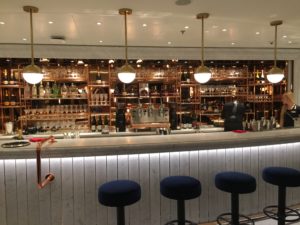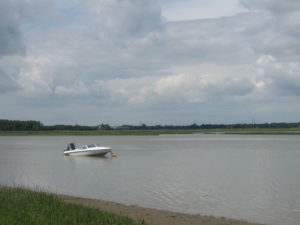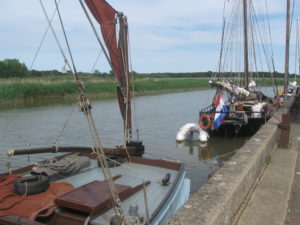A hot day and a full stomach: just a short walk was sufficient. Before we started there was time to look about: displays of various kinds make Snape Maltings a continual source of interest. The sailing barge adds more. And of course there are the famous sculptures outside the concert hall.
We had two choices from Snape Maltings, since the sailors’ path to Aldeburgh was too long and the spinney circuit too short: all the way to Iken church, a four mile return journey, or one mile to so-called Iken Cliff. River views and the incoming tide made this enjoyable but in no sense energetic. The path is narrow so wheelchairs are not suitable, although part of the route is on a boardwalk slightly wider than the path with marsh pools on either side and is perhaps passable by wheelchair.
At the beginning a large signboard gives some detail, though we found the concert hall booking office posters were more use. There are stretches between trees, sometimes pine (at the beginning) then oak, including one very old specimen looking as if pollarded centuries ago. Eventually the route follows the water’s edge to landing stages for the local kayak hire company (with its rental cottages) or private boats. A campsite has a few large tents on the ‘cliff’ and some large concrete blocks serve as a marker below. We sat on these for the view across to Iken church and back to Snape Maltings.
A boat made its way into the estuary as we sat but there were no marsh harriers, as we had seen on a previous visit. It was tempting to go on to the church, which is a very special place – perhaps the earliest foundation in East Anglia – but there was a commitment to be home by early evening. Next time perhaps: Snape is only half an hour or so from where we live. We have concert tickets for August, so one of those days may serve.
Birds were beginning to cruise in as the tide rose. Not having brought binoculars we just had to guess at their identities. Unseen warblers called from the reeds though. A somewhat less distended stomach was at least achieved: ‘a poor [thing] sir but mine own.’










